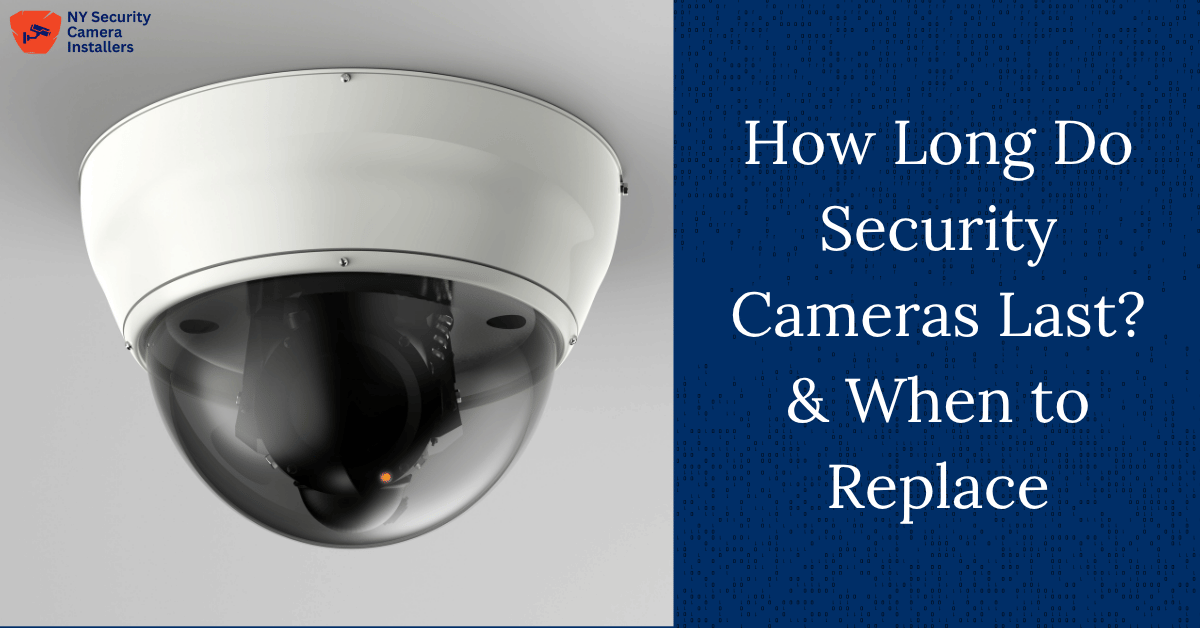You probably don’t keep track of how old your security cameras are, and honestly, why would you? They’re just supposed to work in the background.
But over time, image quality fades, updates stop coming, and suddenly that “still fine” camera isn’t doing much protecting.
We’ll get into how long cameras really last, what shortens their lifespan, and how to know when it’s time to replace them.
Key Notes
- Most security cameras last 5-10 years, with specific lifespans varying by camera type.
- Environmental factors like temperature extremes and moisture significantly impact durability.
- Regular maintenance, including cleaning, software updates, and cable inspections, extends camera life.
- Warning signs of camera failure include image degradation, connectivity issues, and unusual noises.
Security Camera Lifespan
The lifespan of security cameras depends on their type, location, and exposure to environmental elements.
Here’s a breakdown of different camera types:
- IP Cameras: Typically last 5-8 years with proper maintenance.
- Analog CCTV Cameras: Generally function for 6-10 years due to simpler components.
- Wireless Cameras: Often have shorter lifespans of 3-6 years due to additional electronic components.
Outdoor cameras face more wear due to environmental exposure. Temperature fluctuations, moisture, UV radiation, and debris all contribute to their deterioration.
Those with IP66 or higher ratings can match indoor lifespans when well-maintained.
Technological Considerations: Obsolescence vs. Physical Deterioration
Security cameras age both physically and technologically.
Physical components like image sensors, infrared LEDs, and power components have limited lifespans.
However, technological obsolescence often necessitates replacement sooner due to new security protocols and compatibility issues.
Cybersecurity and Functional Lifespan
Firmware support and cybersecurity are critical.
Cameras without regular updates are vulnerable to exploitation. Choose brands with long-term support for security updates.
Maintenance Practices to Extend Camera Life
Implementing proper maintenance significantly extends security camera lifespan.
Regular cleaning, software updates, and careful camera installation are essential.
Professional installations often last longer than DIY due to superior sealing and cable management.
Battery and Power Management
Battery life is crucial for wireless cameras. Regularly optimize motion detection zones and ensure strong Wi-Fi connectivity to preserve battery life.
For wired systems, surge protection and stable power are vital.
When to Replace Your Security Camera?
Even the best security cameras have a shelf life. Knowing when to replace them helps you avoid blind spots, security breaches, and costly downtime.
Here’s what to watch for:
1. Image or Video Quality Is Declining
Blurry footage? Washed-out colors? Struggling with night vision? These are often the first signs your camera’s lens or internal sensor is degrading.
If your footage isn’t sharp enough to identify people or license plates, it’s time for an upgrade.
2. Connectivity Is Unreliable
Frequent disconnections or lag – especially in wireless cameras – can point to outdated firmware, hardware issues, or failing antennas.
If resets aren’t fixing it, replacement may be the most reliable fix.
3. Outdated Technology or Software
Older cameras may not support current video formats, security protocols, or integrations with modern systems.
If your camera no longer gets firmware updates or can’t integrate with your new smart home or security platform, it’s likely past its prime, even if it still “works.”
4. No Support or Spare Parts Available
If the manufacturer no longer supports your model or parts like mounts, cables, or batteries are unavailable, replacement becomes your only real option.
Unsupported devices are also more vulnerable to cybersecurity threats.
5. Physical Damage or Wear
Visible damage like cracks, corrosion, or water intrusion (even minor) is a clear red flag, especially for outdoor cameras.
Over time, even weather-resistant models break down, particularly if exposed to extreme temperatures or debris.
6. Reduced Infrared/Night Vision Performance
Many users don’t notice night vision deterioration until they need it. If your camera struggles to capture clear nighttime footage or IR LEDs are visibly dimming, don’t wait to replace it.
7. Cameras Are Over 5–7 Years Old
Even if everything seems fine, security best practices recommend replacing cameras every 5–7 years.
Newer models often offer better resolution, improved AI features (like motion analytics or license plate recognition), and stronger cybersecurity – helping you stay ahead of evolving threats.
Not Sure If It’s Time To Replace Your Cameras?
Frequently Asked Questions
Can I extend my security camera’s warranty beyond the manufacturer’s coverage?
Yes, extended warranty plans are available through retailers and third parties, usually costing 10-20% of the purchase price for an additional 1-5 years of coverage.
How do power surges affect security camera lifespan, and how can I protect against them?
Power surges can damage circuitry instantly. Use surge protectors or uninterruptible power supplies (UPS) for protection.
Are there differences in lifespan between wired and wireless security cameras?
Wired cameras typically last 2-3 years longer due to stable power supplies. Wireless cameras, however, offer more installation flexibility.
How often should I replace my security cameras even if they appear to be working properly?
Replace every 5-7 years to benefit from technological advancements and improved security features.
Do DIY security camera systems last as long as professionally installed systems?
Professional installations generally last 1-3 years longer due to optimal positioning and weatherproofing, but DIY systems can match this with careful adherence to guidelines.
Conclusion
Security cameras don’t last forever, and knowing when to replace them makes all the difference in keeping your property protected.
Most systems hold up for 5–10 years, but environmental wear, outdated tech, and performance issues can cut that short.
Signs like blurry footage, dropped connections, or lack of software updates are all signals it’s time for a refresh. Even if your cameras still seem to work, swapping them out every few years ensures better performance, better protection, and fewer surprises.
If you’re wondering whether your current setup is still doing its job, reach out for a free, no-obligation quote tailored to your security camera needs.


